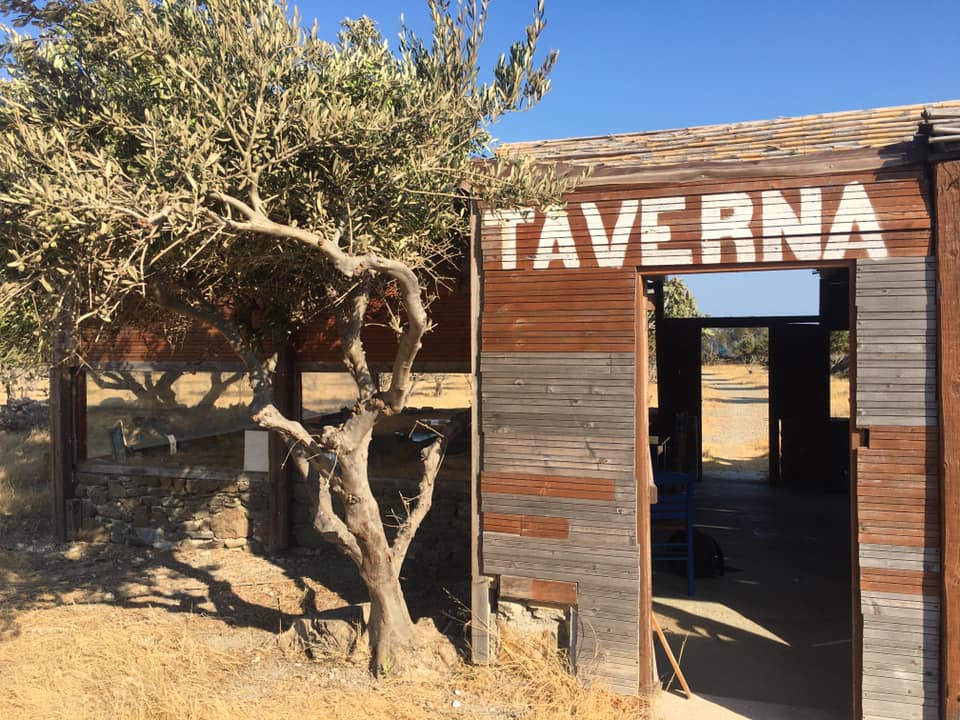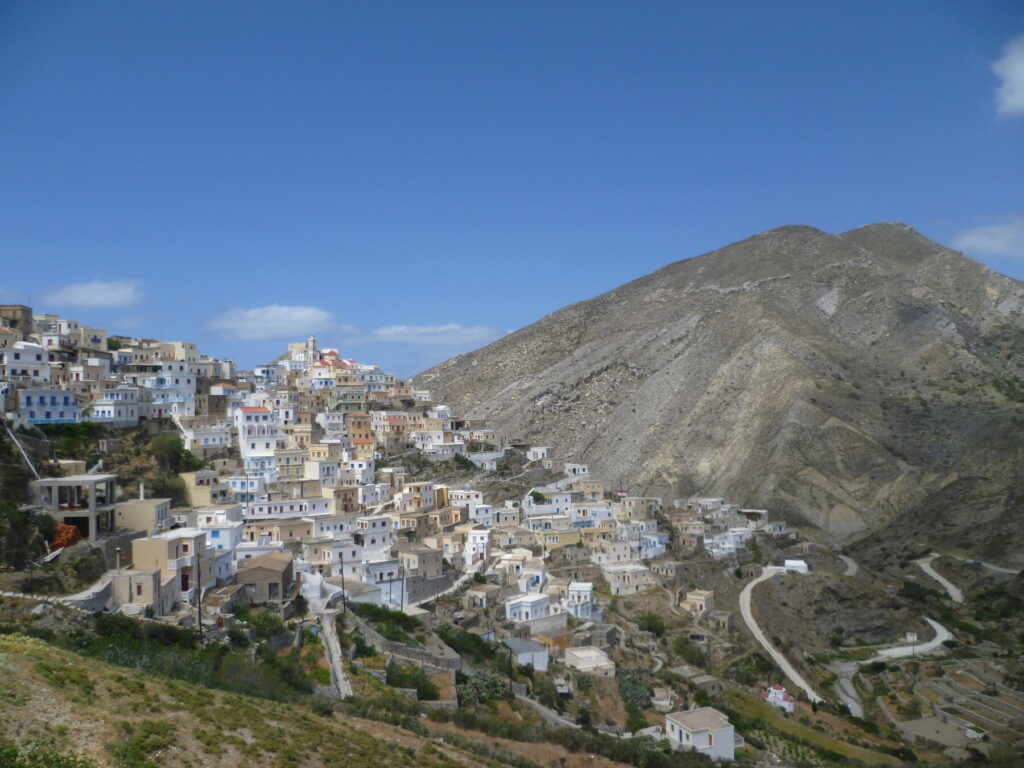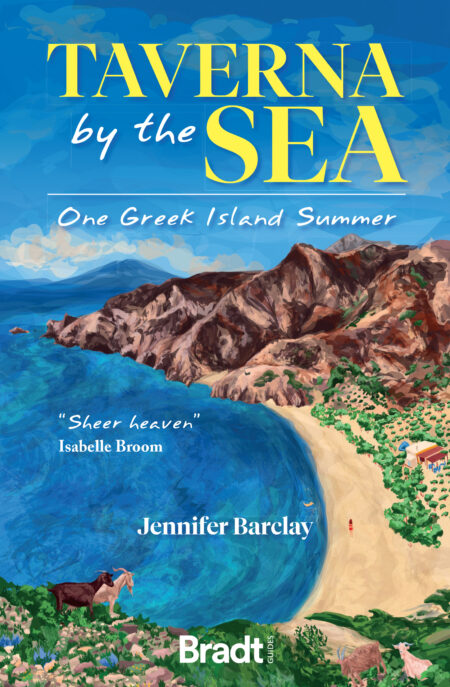I wake up in a panic: there’s a large fish in the tent with me. Not alive, but on a platter, and customers outside waiting for it. I sit up, anxious. It’s very dark. I can’t hear anyone. I realise I must have been dreaming again. It’s happening a lot, dreaming that I’ve forgotten an order during this busiest part of summer.
It felt like a dream, so much of the time: living at a taverna by a beach far from anywhere, on a Greek island. It was a summer of waking to a pink dawn over the olive grove, swimming in moonlight, hearing only the waves or the wind; a kitchen full of creamy yoghurt and honey and tomatoes, olive oil and rosemary and fresh fish. There were days of music; days of no water; days with a goat tied to a tree.
‘Must be comfortable in beachwear,’ Minas had said, explaining what he wrote in his ads for waitresses in an attempt to get applications from attractive women – and sometimes it succeeded, though that summer the only people who came looking for work were Albanian men. It probably seemed too lonely for most people. For a while I wanted to stay forever; yet I ended up leaving in the night with my dog and my backpack and a bag of money.

The story started in late April, when I planned a few days of walking on an island I’d never visited before.
* * *
‘Kalimera Jennifer!’ Irini shouted out, as she did every morning when she walked past my house. It was a lovely ritual.
I was sitting at my desk, where the window looked out over a medieval chapel and to sweeping views of the wild hillsides of the island of Tilos. Lisa, my honey-blonde golden retriever mixed with something slightly smaller and more annoying, was barking through the railings while wagging her tail just as she did whenever Irini or anyone else passed. Living in the middle of a Greek village, it was tricky sometimes having a dog who barked at every footfall or cat. Still, it gave me a good reason to get up and leave off my work at the laptop for a moment. I stepped outside to grab her and calm her down.
‘Have you noticed how every morning I say “good day”? What a beautiful day.’ Irini sighed and leaned on her stick as she paused to enjoy the view, the light and warmth of spring. ‘Does England have sun like this?’
I laughed and said no – it was one of the reasons why I’d moved to Greece five years earlier – as I stood in the courtyard with the lemon tree, remembering I needed to sweep up the fallen leaves before I left for my trip.
‘You’re up early working and I’m late, I’m lazy!’ noted Irini.
‘But Irini, do you ever take a day off? I’m going on holiday this week!’
‘Ah, that’s good, kori mou.’ She often used this term of endearment, literally ‘my daughter’.
As Irini continued on her way to open her little shop, Lisa went immediately back to snoozing in the shade while I reluctantly returned to my desk.
For someone who loved books, reading and writing and working from a little island, my job editing manuscripts from home was perfect. But recently I’d been caught up in an endless project for a client who seemed to be going mad. I desperately wanted to close the computer and not open it for a very long time.
Thankfully, the conclusion was now in sight, the light at the end of the tunnel, and I’d booked myself an open-ended trip to the island of Karpathos. For a writing project of my own, I’d been researching the deserted places of the Dodecanese, the group of islands where I lived, inspired by the people still living in remote areas. I’d recently had a few days wandering alone around the biggest mountain on Rhodes and was excited to do some hikes around a village called Olympos in the north of Karpathos that was celebrated for clinging on to its cultural traditions.
Karpathos wasn’t far away; in fact, from the village where I lived, the island was visible on the horizon on clear days. But getting there wasn’t straightforward, involving two ferry journeys. I’d originally planned to visit earlier, wanting to witness everyday life outside the tourism season, and had found a hotel online, but was surprised by the distances involved. It was a big island, the third biggest in the Dodecanese, and although it had an airport in the south, there was little public transport to the north in winter. I decided to wait until I had more time and arrange for a pet-sitter for Lisa. While I didn’t like leaving her behind, it could be difficult travelling with a dog. Through a pet-sitting website I’d connected with a young American woman called Tess who would come and stay in my house.

When almost ready to leave, I had problems booking a ticket online for the Prevelis ferry from Rhodes to Diafani, the port in the north of Karpathos closest to Olympos. ‘No availability,’ declared the website, which seemed unlikely. I contacted Minas, the hotel owner I’d been emailing in Olympos, who explained that the ferry dock in Diafani had been destroyed by a storm so the ship couldn’t land there. I’d have to make the long journey from Pigadia, the port in the south, but the bus only ran once a week, three days after the ferry arrived. The whole thing seemed a bit difficult, but somehow that made it more intriguing. I decided just to set off and see what happened. I hoped to get to Olympos a few days before Easter week, at the end of April, and booked three nights at the hotel.
Tess arrived on the boat and I was reassured by her open, adaptable nature. Tilos was green and lush with gentle weather at this time of year and she seemed very happy to borrow my home and canine companion and get to know my neighbours. I wasn’t sure exactly how long I’d be gone, maybe a week, maybe two, depending on ferry connections, but she could do her work from anywhere and was content to stay as long as needed.
I left on the Friday boat to Rhodes, where I finished the project from hell while awaiting my onward ferry connection south. I was relaxed and excited now the journey had begun, pleased to be meeting people and speaking Greek. A local friend of mine commented that Olympos was a difficult place; when I asked her why she just said, ‘You will see.’ Sipping wine in a bar on Pythagoras Street close to midnight on Saturday, I met a young bartender who presented me with a white rose that he made out of a napkin. The guys at the bar bought me another drink and confirmed it was worth going to Olympos: it was beautiful; they still made traditional leather boots there; and it had always been a matriarchal society, the women inheriting property and being in charge of the money. But there would be nothing to do except eat and sleep, said the bartender, although he’d never been there. ‘You must come back here for Easter. If you don’t, you’re in big trouble.’
Grinning, at 2am I retrieved my backpack with the tent strapped on to it, waved goodbye and walked to the port past crowds of people standing outside the music bars of the Old Town, thinking how much I loved life in Greece.
More information
To read more about Jennifer Barclay’s Grecian summer, check out her book:
